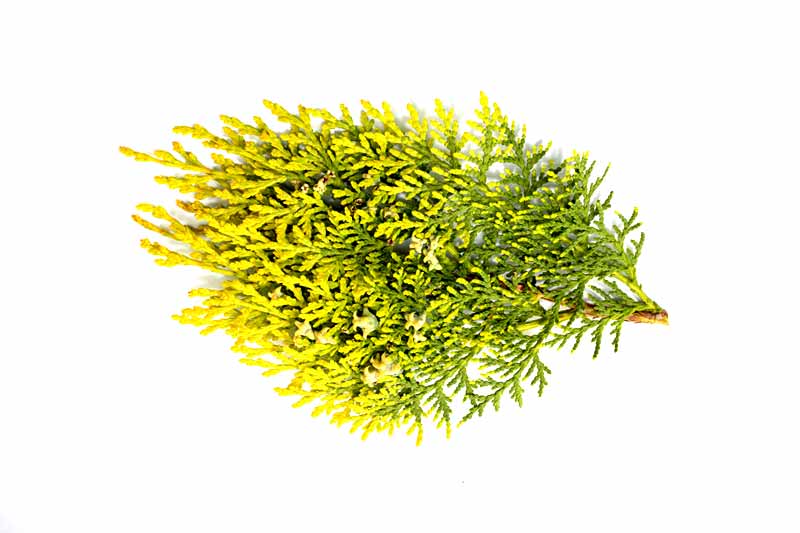Quick Facts
Botanical Name: Thuja occidentalis
Family Name: Cupressaceae (cypress family)
Common Name: Thuja, Eastern White Cedar, Yellow Cedar
Part used: Wood
Specific Gravity: 0.941~0.966 @ 25/25 °C
Optical Rotation: -5 ~ +10 degree @ 20 °C
Refractive Index: 1.503 ~1.508 @ 20 °C
Blends Well with:- Pine, Cedar wood, Armoise, Lemon, Mandarin and Lavender.
Uses: This oil is used for the manufacturing of soaps and detergents where it acts as a fixative. It is also used in the preparation of fragrances, antiseptics, men's colognes and cosmetics as well.
Medicinal uses of this oil are for the ailments such as bronchitis, cough, acne, arthritis, stress, dandruff, dermatitis, scurvy and preventing hair loss.
Countries where it's found
Morocco is a source of Thuja Wood Oil as it cultivates it in the Atlas Mountains; East Africa is also a major producer of the same. In India this oil is produced in the Northern part of this country i.e. The Himalayas. Other Countries which are also involved in the production of this oil are China, states of Texas and Virginia of the United States.
Harvesting Information
Thuja is an evergreen growing tree; it grows well in damp forest and coniferous marshy lands. It needs full sun to light shade. Soil should be rich in Calcium having a neutral to Alkaline Ph level and moist condition is also essential for its growth. It has a life span of 400-800 years as it grows very slowly.
History of the Plant
Thuja is an evergreen coniferous tree in the cypress family Cupressaceae native to North east of the United States and the South east of Canada. Thuja is also called "Arbor vitae", in Latin means the 'tree of life', for several thousand years it has been a very famous plant in China. The Chinese cultivated Thuja as an ornamental tree and used it for religious purposes. Thuja was also used as incense by ancient civilizations.
 Extraction Process
Extraction Process
The Thuja Wood Oil is extracted using the steam distillation method from the leaves and twigs of Thuja tree .The oil extracted has the following characteristics; it's of clear yellow colour to nearly colourless and it contains a sweet odour. Its constituents are camphene, terpinen-4-ol, bornyl, acetate a-thujone, d-sabinene, b-thujone, a-pinene, and fenchone.
Commonly known Benefits
Anti-rheumatic: Thuja Wood Oil contains diuretic properties and it acts as a detoxifier .Thuja Wood Oil improves circulation of blood and lymph. Due to its diuretic property, it helps on increasing the process of urination and the pace of the removal of the toxic and undesirable substances like excess amount of water, salts and uric acid from the body in the form of urine. Thus it helps curing Rheumatism.
Insect Repellent: The property of toxicity of Thuja Wood Oil helps in killing the insects and prevents them to enter your house. There are parasitic insects like ticks, fleas, mosquitoes and lice this oil helps to eradicate them. This oil can be used as in sprays and insect repellent vaporizers.
Stimulant: Thuja Wood Oil works well as a stimulant for blood circulation, it helps in the stimulation of glands and organs which leads to secretion of essential hormones, acids, enzymes, gastric juices. It also stimulates leucocytes, platelets and helps in the quick regeneration of growth cells. Consequently this oil stimulates the entire body which leads to faster metabolism and stimulates better growth and provides immunity against diseases.
Additional Benefits: Thuja Wood Oil is very useful for the treatment of cystitis, coughs, moles and other eruptions. It's also proven to be useful in the treatment of skin cancer. It acts as a vermifuge and eliminates worms like tape worms round worms, and hook worms in the Human body





